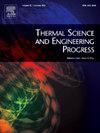Improving vehicle warm-up performance in cold conditions using phase change materials
IF 5.1
3区 工程技术
Q2 ENERGY & FUELS
引用次数: 0
Abstract
In cold climates, improving vehicle warm-up performance is crucial for reducing emissions and fuel consumption. Traditional methods often fail to efficiently address this issue, particularly during initial cold start periods. This study aims to enhance vehicle warm-up performance in cold conditions using phase change materials (PCMs). A thermal energy storage device was developed using paraffin wax, selected for its high energy density and a melting point of 69.3 °C, integrated with an optimized heat exchanger. Real road driving tests were conducted under urban and highway conditions, with temperatures ranging from −5 to 0 °C, using a 2.2L diesel engine vehicle. The results demonstrated a significant reduction in engine warm-up time by 20–30 %, leading to a decrease in fuel consumption and CO emissions by 365–517 g annually. The thermal energy storage device supplied up to 694.63 kJ of heat energy to the coolant, further improving vehicle efficiency and reducing environmental impact. Furthermore, evaluating PCM-based systems under real-world driving conditions is crucial for validating their practical effectiveness. Real-world variables introduce challenges that help confirm the applicability of PCM-based systems in everyday use. This approach shows potential for enhancing warm-up performance in cold climates without additional fuel consumption, outperforming conventional methods.
利用相变材料提高车辆在寒冷条件下的预热性能
在寒冷的气候条件下,提高车辆预热性能对于减少排放和油耗至关重要。传统方法往往无法有效解决这一问题,尤其是在冷启动初期。本研究旨在利用相变材料(PCM)提高车辆在寒冷条件下的预热性能。石蜡具有高能量密度,熔点为 69.3 °C,本研究利用石蜡开发了一种热能储存装置,并将其与优化的热交换器集成在一起。使用 2.2L 柴油发动机汽车在城市和高速公路条件下进行了实际道路驾驶测试,温度范围为 -5 至 0 °C。结果表明,发动机预热时间显著缩短了 20%-30%,从而使油耗和二氧化碳排放量每年减少 365-517 克。热能储存装置为冷却液提供了高达 694.63 千焦的热能,进一步提高了车辆效率,减少了对环境的影响。此外,在实际驾驶条件下评估基于 PCM 的系统对于验证其实际效果至关重要。真实世界的各种变量带来的挑战有助于确认基于 PCM 的系统在日常使用中的适用性。这种方法显示出在寒冷气候条件下提高预热性能的潜力,而且不会增加油耗,性能优于传统方法。
本文章由计算机程序翻译,如有差异,请以英文原文为准。
求助全文
约1分钟内获得全文
求助全文
来源期刊

Thermal Science and Engineering Progress
Chemical Engineering-Fluid Flow and Transfer Processes
CiteScore
7.20
自引率
10.40%
发文量
327
审稿时长
41 days
期刊介绍:
Thermal Science and Engineering Progress (TSEP) publishes original, high-quality research articles that span activities ranging from fundamental scientific research and discussion of the more controversial thermodynamic theories, to developments in thermal engineering that are in many instances examples of the way scientists and engineers are addressing the challenges facing a growing population – smart cities and global warming – maximising thermodynamic efficiencies and minimising all heat losses. It is intended that these will be of current relevance and interest to industry, academia and other practitioners. It is evident that many specialised journals in thermal and, to some extent, in fluid disciplines tend to focus on topics that can be classified as fundamental in nature, or are ‘applied’ and near-market. Thermal Science and Engineering Progress will bridge the gap between these two areas, allowing authors to make an easy choice, should they or a journal editor feel that their papers are ‘out of scope’ when considering other journals. The range of topics covered by Thermal Science and Engineering Progress addresses the rapid rate of development being made in thermal transfer processes as they affect traditional fields, and important growth in the topical research areas of aerospace, thermal biological and medical systems, electronics and nano-technologies, renewable energy systems, food production (including agriculture), and the need to minimise man-made thermal impacts on climate change. Review articles on appropriate topics for TSEP are encouraged, although until TSEP is fully established, these will be limited in number. Before submitting such articles, please contact one of the Editors, or a member of the Editorial Advisory Board with an outline of your proposal and your expertise in the area of your review.
 求助内容:
求助内容: 应助结果提醒方式:
应助结果提醒方式:


